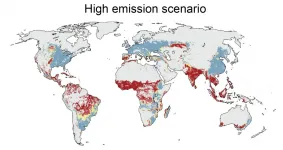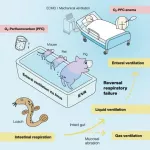(Press-News.org) The question of why we dream is a divisive topic within the scientific community: it's hard to prove concretely why dreams occur and the neuroscience field is saturated with hypotheses. Inspired by techniques used to train deep neural networks, Erik Hoel (@erikphoel), a research assistant professor of neuroscience at Tufts University, argues for a new theory of dreams: the overfitted brain hypothesis. The hypothesis, described May 14 in a review in the journal Patterns, suggests that the strangeness of our dreams serves to help our brains better generalize our day-to-day experiences.
"There's obviously an incredible number of theories of why we dream," says Hoel. "But I wanted to bring to attention a theory of dreams that takes dreaming itself very seriously--that says the experience of dreams is why you're dreaming."
A common problem when it comes to training AI is that it becomes too familiar with the data it's trained on--it starts to assume that the training set is a perfect representation of anything it might encounter. Data scientists fix this by introducing some chaos into the data; in one such regularization method, called "dropout," some data is randomly ignored. Imagine if black boxes suddenly appeared on the internal screen of a self-driving car: the car that sees the random black boxes on the screen and focuses on overarching details of its surroundings, rather than the specifics of that particular driving experience, will likely better understand the general experience of driving.
"The original inspiration for deep neural networks was the brain," Hoel says. And while comparing the brain to technology is not new, he explains that using deep neural networks to describe the overfitted brain hypothesis was a natural connection. "If you look at the techniques that people use in regularization of deep learning, it's often the case that those techniques bear some striking similarities to dreams," he says.
With that in mind, his new theory suggests that dreams happen to make our understanding of the world less simplistic and more well-rounded--because our brains, like deep neural networks, also become too familiar with the "training set" of our everyday lives. To counteract the familiarity, he suggests, the brain creates a weirded version of the world in dreams, the mind's version of dropout. "It is the very strangeness of dreams in their divergence from waking experience that gives them their biological function," he writes.
Hoel says that there's already evidence from neuroscience research to support the overfitted brain hypothesis. For example, it's been shown that the most reliable way to prompt dreams about something that happens in real life is to repetitively perform a novel task while you are awake. He argues that when you over-train on a novel task, the condition of overfitting is triggered, and your brain attempts to then generalize for this task by creating dreams.
But he believes that there's also research that could be done to determine whether this is really why we dream. He says that well-designed behavioral tests could differentiate between generalization and memorization and the effect of sleep deprivation on both.
Another area he's interested to explore is on the idea of "artificial dreams." He came up with overfitted brain hypothesis while thinking about the purpose of works of fiction like film or novels. Now, he hypothesizes that outside stimuli like novels or TV shows might act as dream "substitutions"--and that they could perhaps even be designed to help delay the cognitive effects of sleep deprivation by emphasizing their dream-like nature (for instance, by virtual reality technology).
While you can simply turn off learning in artificial neural networks, Hoel says, you can't do that with a brain. Brains are always learning new things--and that's where the overfitted brain hypothesis comes in to help. "Life is boring sometimes," he says. "Dreams are there to keep you from becoming too fitted to the model of the world."
INFORMATION:
Erik Hoel is also the author of The Revelations, a novel publishing April 6 from Abrams Books: https://www.abramsbooks.com/product/revelations_9781419750229/.
Patterns, Hoel: "The Overfitted Brain: Dreams evolved to assist generalization" https://www.cell.com/patterns/fulltext/S2666-3899(21)00064-7
Patterns (@Patterns_CP), published by Cell Press, is a data science journal publishing original research focusing on solutions to the cross-disciplinary problems that all researchers face when dealing with data, as well as articles about datasets, software code, algorithms, infrastructures, etc., with permanent links to these research outputs. Visit https://www.cell.com/patterns. To receive Cell Press media alerts, please contact press@cell.com.
Rodents and pigs share with certain aquatic organisms the ability to use their intestines for respiration, finds a study publishing May 14th in the journal Med. The researchers demonstrated that the delivery of oxygen gas or oxygenated liquid through the rectum provided vital rescue to two mammalian models of respiratory failure.
"Artificial respiratory support plays a vital role in the clinical management of respiratory failure due to severe illnesses such as pneumonia or acute respiratory distress syndrome," says senior study author Takanori Takebe (@TakebeLab) of the Tokyo Medical and Dental University and the Cincinnati Children's Hospital Medical Center. "Although the side effects and safety need to be thoroughly ...
Climate change is known to negatively affect agriculture and livestock, but there has been little scientific knowledge on which regions of the planet would be touched or what the biggest risks may be. New research led by Aalto University assesses just how global food production will be affected if greenhouse gas emissions are left uncut. The study is published in the prestigious journal One Earth on Friday 14 May.
'Our research shows that rapid, out-of-control growth of greenhouse gas emissions may, by the end of the century, lead to more than a third of current global food production falling into conditions in which no food is produced today - that is, out of safe climatic space,' explains Matti Kummu, professor of global water and food issues at Aalto University.
According ...
What The Study Did: Researchers analyzed changes in filled prescriptions for naloxone (medication to reverse opioid overdoses) during the COVID-19 pandemic in the United States and compared them with changes in opioid prescriptions and overall prescriptions.
Authors: Ashley L. O'Donoghue, Ph.D., of the Beth Israel Deaconess Medical Center in Boston, is the corresponding author.
To access the embargoed study: Visit our For The Media website at this link https://media.jamanetwork.com/
(doi:10.1001/jamahealthforum.2021.0393)
Editor's Note: The ...
What The Study Did: Associations of staffing and testing interventions with COVID-19 transmission in nursing homes are examined in this decision analytical modeling study.
Authors: Rebecca Kahn, Ph.D., of the Harvard T.H. Chan School of Public Health in Boston, is the corresponding author.
To access the embargoed study: Visit our For The Media website at this link https://media.jamanetwork.com/
(doi:10.1001/jamanetworkopen.2021.10071)
Editor's Note: The article includes conflict of interest and funding/support disclosures. Please see the article for additional information, including other authors, author contributions and affiliations, conflict of interest and financial disclosures, ...
What The Study Did: This is a qualitative study that evaluates a crowdsourcing open call to gather community input for engaging the university community in COVID-19 safety strategies.
Authors: Suzanne Day, Ph.D., of the University of North Carolina at Chapel Hill, is the corresponding author.
To access the embargoed study: Visit our For The Media website at this link https://media.jamanetwork.com/
(doi:10.1001/jamanetworkopen.2021.10090)
Editor's Note: This article includes funding/support disclosures. Please see the article for additional information, including other authors, author contributions and affiliations, conflict of interest and financial disclosures, and funding and support.
INFORMATION:
Media ...
What The Study Did: Researchers evaluated the compliance of hospitals with a Centers for Medicare & Medicaid Services ruling mandating that a list of charges for services, procedures and items be publicly available and in a machine-readable file.
Authors: David Hsiehchen, M.D., of the University of Texas Southwestern Medical Center in Dallas, is the corresponding author.
To access the embargoed study: Visit our For The Media website at this link https://media.jamanetwork.com/
(doi:10.1001/jamanetworkopen.2021.10109)
Editor's Note: Please see the article for additional information, ...
Tokyo, Japan - Oxygen is crucial to many forms of life. Its delivery to the organs and tissues of the body through the process of respiration is vital for most biological processes. Now, researchers at Tokyo Medical and Dental University (TMDU) have shown that oxygen can be delivered through the wall of the intestine to compensate for the reduced availability of oxygen within the body that occurs in lung diseases that cause respiratory failure.
To breathe is to live; for higher animals, respiration involves absorbing oxygen and excreting carbon dioxide at gills or in the lungs. However, some animals have evolved alternative ventilatory mechanisms: loaches, catfish, sea cucumbers and orb-weaving spiders can absorb oxygen through their hindgut to ...
Scientists have uncovered the exact mechanism that causes new solar cells to break down, and suggest a potential solution.
Solar cells harness energy from the Sun and provide an alternative to non-renewable energy sources like fossil fuels. However, they face challenges from costly manufacturing processes and poor efficiency - the amount of sunlight converted to useable energy.
Perovskites are materials developed for next-generation solar cells. Although perovskites are more flexible cheaper to make than traditional silicon-based solar panels and deliver similar efficiency, perovskites ...
University of Alberta scientists have identified a receptor in cells that could be key to preventing permanent hearing loss in childhood cancer survivors who are being treated with the drug cisplatin. The researchers believe by inhibiting the receptor, they may be able to eliminate toxic side-effects from the drug that cause the hearing loss.
Cisplatin is an incredibly effective chemotherapeutic when it comes to treating solid tumours in children, contributing to an 80 per cent overall survival rate over five years, according to U of A researcher Amit Bhavsar, an assistant professor in the Department of Medical Microbiology & Immunology. The problem ...
Boston - While overall emergency department visits have decreased during the pandemic, nonfatal opioid overdose visits have more than doubled. However, few patients who overdosed on opioids had received a prescription for naloxone, a medication designed to block the effects of opioids on the brain and rapidly reverse opioid overdose.
In a new study, clinician-researchers at Beth Israel Deaconess Medical Center (BIDMC) analyzed naloxone prescription trends during the COVID-19 pandemic in the United States and compared them to trends in opioid prescriptions and to overall prescriptions. The team's findings, published in the journal JAMA Health Forum, suggest patents with opioid misuse disorders may be experiencing a dangerous decrease in access to the overdose-reversing ...



